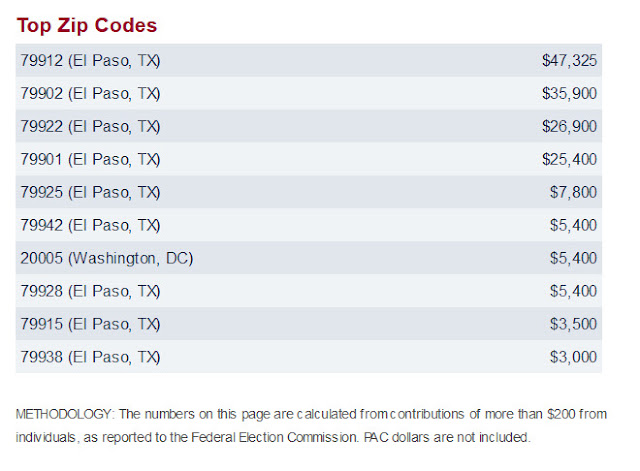In 2015, Almost 50% of Beto O'Rourke's Top Expenditures Went to Suzie Byrd
U.S. Representative's Cronyism and Self Dealing; $81,152 in 2014
According to www.opensecrets.com, in 2015, almost 50% of the Beto O'Rourke's top expenditures went to former City Representative, Suzie Byrd.
In 2014, 24% of the representatives top expenditures went to Suzie Byrd, although the total amount was larger: $81,152.00 (made in 47 payments).
The Merriam Webster Dictionary defines "cronyism" as: "the unfair practice by a powerful person (such as a politician) of giving jobs and other favors to friends."
For 2015, Open Secrets lists the top expenditure to vendors / recipients, and of those top expenditures, there is an amount for $21,000 divided in to 12 payments, and a seperate amount for $10,500 divided into six payments, for a total of $31,500. The payments are made to Moxie Communications and Consulting, which is owned by Byrd (Note 1).

Source: OpenSecrets.com
Full Link: https://www.opensecrets.org/politicians/expend.php?cycle=2016&cid=N00033540&type=I
Looking at all U.S. Senators and Representatives, O'Rourke is the only one to "use" Moxie's services, or at least pay out a check (see Open Secrets for 2014).
In 2014, as you may remember, Byrd was "spokesperson" for the El Paso Childrens Hospital, but as things got messy with the hospital, she was no longer mentioned as "spokesperson."
Are Payments to Stanton Street Technology Self-Dealing
In both 2014 and 2015, O'Rourke profited from his political contributions, shifting money to Stanton Street Technology Group. In 2014, he paid his own company $39,063 (11.7% to top expenditure) and in 2015, he paid his own company $1,335.
Why So Much on "Communications" During a Non-Contested Primary
The curious thing is why the Congressman needs to pay Byrd so much money when he already had a "Communications Director." According to The Sunlight Foundation, "John Meza" is listed in this position (Note 2).
It could be that Byrd is used in his re-election bid, however, O'Rourke had no serious opponent in the last election cycle. In a straight-ticket Democratic-voting district, why would Byrd need to be paid so much money?
Note 1 - see "Rep. Susie Byrd believes in success through hard work and listening to the community".
Note 2 - Several sources point to this. See http://staffers.sunlightfoundation.com/member/O000170 and http://congressional-staff.insidegov.com/d/a/House/Rep.-Beto-O'Rourke-%28D-.-TX16%29








